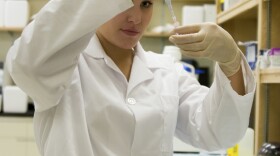
Richard Knox
Since he joined NPR in 2000, Knox has covered a broad range of issues and events in public health, medicine, and science. His reports can be heard on NPR's Morning Edition, All Things Considered, Weekend Edition, Talk of the Nation, and newscasts.
Among other things, Knox's NPR reports have examined the impact of HIV/AIDS in Africa, North America, and the Caribbean; anthrax terrorism; smallpox and other bioterrorism preparedness issues; the rising cost of medical care; early detection of lung cancer; community caregiving; music and the brain; and the SARS epidemic.
Before joining NPR, Knox covered medicine and health for The Boston Globe. His award-winning 1995 articles on medical errors are considered landmarks in the national movement to prevent medical mistakes. Knox is a graduate of the University of Illinois and Columbia University. He has held yearlong fellowships at Stanford and Harvard Universities, and is the author of a 1993 book on Germany's health care system.
He and his wife Jean, an editor, live in Boston. They have two daughters.
-
A Meningitis outbreak occurred after a steroid drug commonly injected into people's spines to relieve back pain was apparently contaminated by an ordinary fungus. The problem shines a light on little-known and lightly regulated companies called compounding pharmacies.
-
The government has named 75 medical facilities that received a potentially contaminated drug suspected of infecting 47 patients with meningitis nationwide.
-
At first it seemed likely that the two known cases of illness from the new cousin-of-SARS virus may have been exposed in or near the Saudi Arabian city of Jeddah. But now it's pretty certain that a 49-year-old Qatari man who had traveled to Jeddah last month didn't pick up the virus there after all.
-
Public health experts have gotten better at detecting new diseases and figuring out their cause since the SARS outbreak nearly 10 years ago. Advances in communications and genetics mean information about new microbes is more accessible.
-
Some lab studies suggested vitamin D supplements might enhance immunity. But a clinical test in New Zealand found that taking vitamin D didn't reduce the frequency or duration of colds for the people who took the supplements.
-
So far only three people in the Democratic Republic of Congo are known to have contracted Bas-Congo hemorrhagic fever, two of whom died. But the small number means that scientists may have found an emerging disease very soon after it made its jump from whatever species it came from into humans.
-
Patients who had multiple counseling sessions lasting 10 to 15 minutes were 12 percent more likely to quit binge drinking a year later, says a federal task force. Those benefits are enough to justify primary care doctors screening all adult patients for signs of problem drinking and providing counseling, the U.S. Preventive Services Task Force says.
-
They found 40 or so key differences — all potential targets for cleverly designed drugs. But the researchers caution that their study is a long way from the outmoded dream of a silver bullet that would knock out breast cancer – or any other kind. The report was published in the journal Nature.
-
The Swedish team transplanted uteruses from two women in their 50s to their daughters, and an Indiana group is recruiting women willing to undergo womb transplants in this country. It's the latest frontier in a field launched in 1954 with a successful kidney transplant. But one expert cautions against premature enthusiasm.
-
The experimental treatment, which hasn't been tried in humans, encapsulates pure oxygen in microbubbles made of fat molecules. The bubbles look quite a bit like shaving cream, one of the researchers says.







